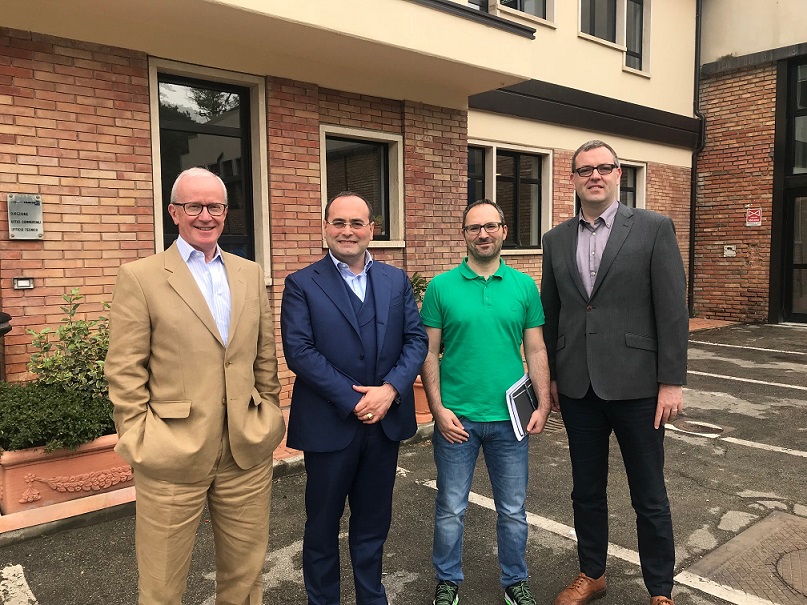Left to right: Dominic Quennell Enertechnos Managing Director; Dr Maurizio Brabagni Tratos Chief Executive; Daniele Dori Tratos Chief Engineer; Gareth O’Brien Enertechnos Operations Director.
Following the completion of testing, Tratos, which sells cables to 52 countries worldwide, has signed an agreement to manufacture Enertechnos’ revolutionary high-tech, low-loss solution. The Capacitive Transfer System (CTS) cable can drastically reduce energy losses, meaning less energy is wasted and carbon emissions are driven down. In developing the cable, Tratos intends to promote its sale to clients all over the world.
Energy losses are a growing problem in the UK. Last year energy system losses totalled 26,554GWh, which is enough energy to power seven million homes and costs the UK just under £1.3 billion. The CTS tackles these losses head on by providing a cost-effective solution to replacing existing outdated cabling and deploying new infrastructure. By balancing reactance and capacitance, the cable’s technology significantly reduces voltage drop during transmission by as much as 50 per cent, resulting in lower energy loss.
Next for the CTS is a real-world trial, that will see it be installed by a leading Distribution Network Operator and has game-changing potential across the energy industry – from boosting the productivity of wind farms, to helping the UK meet the demand necessary for its growing electric vehicle infrastructure.
Dominic Quennell, Managing Director of Enertechnos, said:
“For the last few years, Enertechnos has been working tirelessly to develop the CTS and transform electrical transmission. Today’s news is a game-changer for electrical energy efficiency and we are delighted to be working with Tratos, who are renowned globally for innovation and their exceptionally well-made cables.
“Today’s announcement is a ringing endorsement of Enertechnos’ revolutionary technology and is an important step towards delivering greater energy security, reduced carbon emissions, and lower consumer costs.”
Dr Maurizio Bragagni, CEO of Tratos, said:
“Everyone at Tratos has worked hard to instil innovation at the core of what we do, which is why we are incredibly excited to be working with a company like Enertechnos. We have followed Enertechnos’ journey to develop the CTS closely and are now delighted to join them in the next stage of manufacturing the cable.
“As a forward looking and thinking company, we see a glaring need for a cable which can reduce excessive losses and support evolving infrastructure needs. The CTS provides a much-needed solution, and we look forward to showcasing its vast benefits to our global clients.”
— ENDS –
For further information please contact Caitlin Fordham-Skelton at [email protected] or on 020 7227 1649.
Notes to editor:
- Figures from the Department for Business, Energy and Industrial Strategy show power lost in the transmission and distribution systems totalled 26,554GWh, representing a 1.8 per cent increase from 2016 and accounting for 7.5 per cent of total electricity demand in 2017.
- Based on the ‘societal cost of losses’ set by Ofgem at £48.42/MWh, losses cost the UK £1,285,700,000 in 2017.
- 1.5 per cent of the UK’s total carbon emissions are as a result of electrical losses, according to Ofgem. CTS could help to reduce these emissions by making the UK network infrastructure more efficient.
- The CTS is capable of being run subsea to offshore windfarms, and because of the lower resistance and impedance in CTS, modelling indicates that using the cable could increase the duty-cycle of wind farms by as much as 25 per cent. This means an improvement in the economic performance of a typical 450 MW farm by nearly £270 million over the farm’s 25-year life time.
- National Grid’s Future Energy Scenarios 2018 report shows the massive increase in energy demand that the uptake of electric vehicles will place on the UK’s infrastructure. Annual energy losses make up a significant proportion of the extra demand required to meet the UK’s growing electric vehicle infrastructure needs.
- The CTS’ new cable geometry is inherently more efficient than conventional cabling, yet it looks like, and is compatible with, conventional cabling, meaning it can be deployed seamlessly across our transmission and distribution network. It can also be manufactured using conventional machinery with minimal adaptation.
For further information please contact Caitlin Fordham-Skelton at [email protected] or on 020 7227 1649.
—


